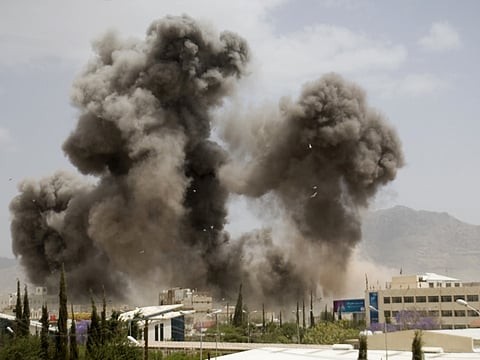Taking care of our own business
In the GCC, we are blessed with a large number of youth who need to be drafted and trained in a broad spectrum of military capabilities

Last Tuesday the Saudi Defence Ministry announced the end of Storm of Resolve — the military campaign made up of forces from a coalition of Gulf Cooperation Council (GCC) countries led by Saudi Arabia to combat the Al Houthi militia who had toppled the regime of President Abd Rabbo Mansour Hadi in Yemen. The coalition also announced the beginning of a new campaign, titled ‘Operation Restoring Hope’, after the month-long air strikes that began on March 26 appeared to fulfil their objectives, according to a statement from the coalition.
A spokesman for the coalition indicated that the campaign had ended upon a request from the Yemeni president who has been residing in Riyadh since his ouster by Al Houthis. The new campaign will now strive to protect civilians and continue fighting terrorism in Yemen, meaning that it does not signal a ceasefire.
The following day, the Saudi ambassador to the United Kingdom stated that the Saudi-led coalition had achieved its goals and should remain a blueprint for future joint Arab action. He added that military intervention in Yemen by Saudi-led coalition forces at the request of Hadi shows that “Arab states are capable of protecting their interests”, and “Iran should not have any say in Yemeni affairs. They are not part of the Arab world. Their interference has ignited instability. They have created havoc in our part of the world and we’ve seen the events that took place because of their malignant policies. Hence you have the coalition and a new foreign policy for all of us. We want an Arab world free of any outside interference. We can deal with our own problems”.
Discussing the now-concluded Storm of Resolve, the ambassador added that the military campaign should put an end to “the perception that we were not capable, not able, that we didn’t have the guts to take such difficult decisions”. He emphasised that the campaign has indeed now entered a new phase. “This is not a ceasefire, but an operation that shifts from being a strategic bombing campaign to one that will support, monitor and sustain the new political agreement that is currently being negotiated based on the UN resolution,” he said while dismissing reports that the dispute was about religious sectarianism. “It is a foreign policy problem. We have a problem with Iran’s foreign policy,” he said.
On the same day, military chiefs from Arab League nations met to discuss means and strategies on building a region-wide military force aimed at combating regional militants. This was a follow-up to an agreement a month earlier to set up a military force and member states were given four months to decide on its composition, precise rules of engagement and required budget. That agreement was prompted by the execution of Egyptian Coptic Christians in Libya by the renegade Daesh (the self-proclaimed Islamic State of Iraq and the Levant).
The drive for peace had gained a fresh momentum following the coalition air strikes against the Al Houthi militia in Yemen. “The creation of a joint Arab force in no way aims to form a new alliance or army hostile to any country, but a force to fight terrorism and maintain security, peace and stability in the region,” the Arab League spokesman said, adding that there was a need to fight terrorism and this force could intervene in internal conflicts. “We cannot ignore internal conflicts and the growth of terrorist organisations in an Arab country and it is wrong to think that these conflicts have no direct or indirect repercussions on other Arab countries,” he said.
Step in the right direction
According to unsubstantiated reports, the newly-formed Arab defence force will be twice the size of Nato’s Response Force with 40,000 men. The air command will consist of 500 to 1,000 men while 3,000 to 5,000 service members will be at the naval command and 34,000 to 35,000 will make up the land forces. Arab governments have been given three months to prepare their proposed drafts for the formation of such a force.
The move has been lauded by a large segment of the Saudi population who feel that a multi-national armed forces unit will only strengthen the bond between the various Arab countries and help them rely upon themselves in times of conflict. Battles like the recently concluded campaign could require ground forces to be deployed to the battlefront and the formation of such a trained unit would be a step in the right direction.
Regional governments should also revisit their military conscription strategies to ensure that their countrymen are up to par in defence of their homeland. In the GCC, we are blessed with a large number of youth who need to be drafted and trained in a broad spectrum of military capabilities to be able to stand up and fight in adverse situations. It is their spot on earth that they may one day find themselves fighting for. The days of farming out conflicts to mercenaries may be coming to an end.
Tariq A. Al Maeena is a Saudi socio-political commentator. He lives in Jeddah, Saudi Arabia.
Sign up for the Daily Briefing
Get the latest news and updates straight to your inbox



